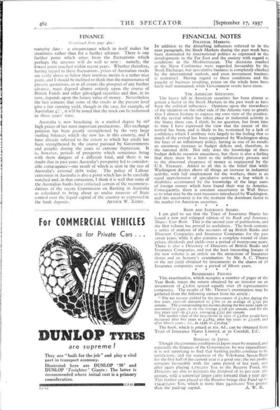THE AMERICAN SITUATION.
The heavy fall in American securities has been almost as potent a factor in the Stock Markets in the past week as have been the political influences. Opinions upon the inwardness of the situation on the other side of the Atlantic vary so greatly that I almost hesitate to express my own view of the position. Of the revival which has taken place in industrial activity in the States there can, I think, be no question, but from time to time I have expressed the view that the extent of this revival has been, and is likely to be, restrained by a lack of confidence which I attribute very largely to the feeling that so much of the revival has been engineered by Washington along the lines of an inflationary policy, having as one of its results an enormous increase in budget deficits and, therefore, in the national debt. Not only does the knowledge of these budget deficits occasion uneasiness, but there is also a feeling that there must be a limit to the inflationary process and to the abnormal cheapness of money as engineered by the U.S. Treasury. Added to all this is the belief that while Washington desires above all things an increase in industrial activity, with full employment for the workers, there is an equal apprehension of speculative activity, a fear which is doubtless accentuated by the knowledge of the large sums of foreign money which have found their way to America. Consequently, there is constant uncertainty in Wall Street as to what may be the next measures introduced by Washington, and this uncertainty is for the moment the dominant factor in the market for American securities.










































 Previous page
Previous page